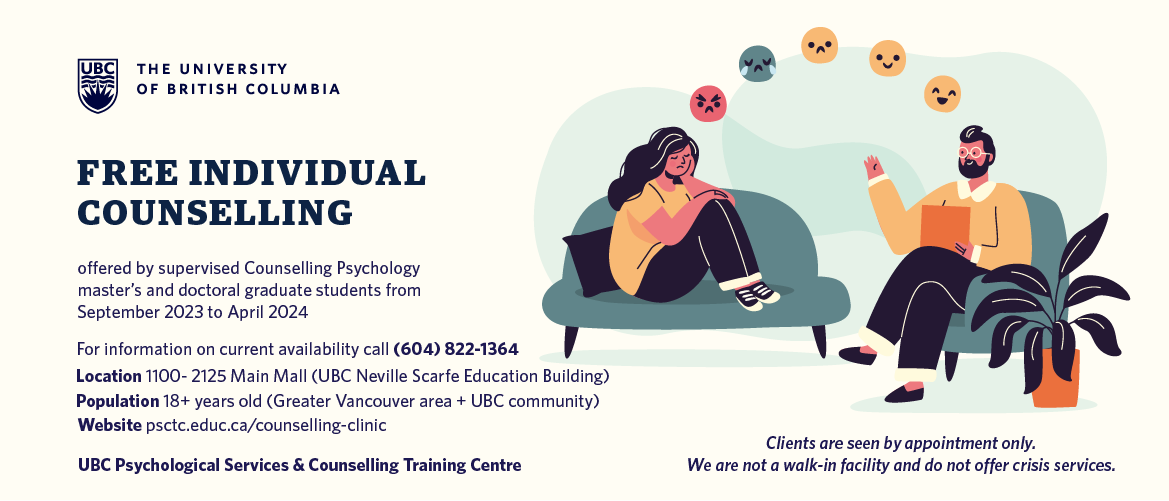How Individual Counselling Toronto helps local teens thrive emotionally
Wiki Article
Recognizing the Relevance of Psychological Treatment for Adolescent Growth and Wellness
Psychological treatment plays a critical role in the development and wellness of young adults. It resolves a series of mental wellness concerns that can prevent their development. Via therapy, adolescents can learn vital coping methods and enhance their emotional knowledge. This procedure promotes durability, allowing them to far better browse life's obstacles. Numerous still hesitate to involve in discussions about mental wellness. Discovering the factors behind this hesitation exposes deeper understandings right into the teen experience.The Impact of Teenager Mental Health on Overall Development
The interaction between teenage mental wellness and total advancement is extensive and multifaceted. During the essential phase of teenage years, people undergo substantial physical, emotional, and social changes that form their identification and future. Mental wellness plays a pivotal duty in this process, influencing scholastic performance, partnerships, and self-esteem. Positive mental wellness fosters durability and flexibility, making it possible for teens to browse obstacles efficiently. Conversely, mental wellness issues can impair cognitive features, disrupt social communications, and prevent emotional guideline, leading to a cascade of developing troubles.Additionally, the setting in which adolescents grow-- encompassing family members dynamics, peer impacts, and social expectations-- engages with their psychological health, more complicating their developmental trajectory. Recognizing the relevance of psychological wellness in this phase is vital for advertising healthy and balanced advancement and making certain that adolescents can flourish, both during their formative years and beyond. Prioritizing mental health assistance can substantially enhance their overall development and future possibility.
Typical Mental Wellness Issues Dealt With by Teenagers
While navigating through the intricacies of adolescence, several young adults come across a variety of mental health concerns that can significantly impact their lives. Anxiety disorders are widespread, usually defined by extreme worry or fear that conflicts with day-to-day tasks. Clinical depression is one more usual concern, manifesting as consistent despair, loss of passion, and difficulty in functioning. In addition, behavioral problems, such as opposite bold disorder, can cause disputes with authority numbers and a struggle to follow societal norms. Eating problems, including anorexia nervosa and bulimia, might develop as teenagers grapple with body picture and social pressures. Material abuse can establish as an illinformed effort to deal with emotional distress. These mental wellness challenges, if unaddressed, can impede scholastic performance and interpersonal partnerships, emphasizing the requirement for recognition and assistance within this susceptible age team.
The Role of Therapy in Structure Coping Strategies
Treatment plays a considerable duty in gearing up teens with efficient coping strategies to navigate their mental wellness obstacles. Through structured sessions, specialists help teenagers determine and recognize their emotions, fostering self-awareness. By making use of various techniques such as cognitive-behavioral therapy, teens discover to test adverse idea patterns and change them with positive ones. This process enables them to develop healthier responses to stressors.Furthermore, treatment supplies a risk-free environment for teenagers to exercise these approaches, facilitating the change from concept to real-life application. Role-playing and scenario analysis permit them to practice coping systems in an encouraging room. As young adults deal with distinct pressures-- scholastic needs, social characteristics, and identity expedition-- having actually customized coping methods comes to be crucial. Inevitably, therapy not only addresses prompt problems however also infuses lifelong abilities that allow adolescents to take care of future challenges, advertising general mental wellness and strength in their development.
Promoting Resilience and Psychological Intelligence Via Treatment
Exactly how can therapy nurture strength and emotional knowledge in young adults? Treatment offers a secure environment where adolescents can explore their behaviors, feelings, and ideas. Through guided discussions and activities, therapists assist young adults identify and recognize their sensations, cultivating emotional recognition. This awareness is a foundation of psychological intelligence, enabling them to understand with others and take care of social connections properly.Additionally, therapy gears up young adults with tools to navigate life's difficulties, advertising durability. By addressing past traumas, dissatisfactions, and stress factors, they learn to develop coping systems that equip them to deal with misfortune. Therapists typically encourage goal-setting, which imparts a sense of function and accomplishment.
As teens exercise these abilities in treatment, they become more adept at dealing with unpredictabilities and obstacles (Individual Counselling Services). Ultimately, this nurturing of durability and psychological intelligence prepares them for the complexities of adult life, enhancing their total psychological health and health

Urging Open Discussion Regarding Mental Health in Teenagers
What approaches can efficiently foster open dialogue concerning mental health amongst young adults? Producing a encouraging and secure atmosphere is basic. Parents and teachers should encourage conversations by stabilizing conversations regarding mental health, emphasizing that it is a significant facet of general wellness. Active listening plays an important duty; grownups need to be non-judgmental and alert when teens share their feelings or concerns.Incorporating psychological health and wellness education right into institution curriculums can additionally facilitate open discussion. Workshops, peer support system, and mental wellness recognition campaigns can encourage teens to express themselves much more openly. Furthermore, utilizing social media sites platforms can be useful, as they are frequently where young adults feel most comfortable connecting. By promoting an atmosphere of depend on and visibility, adults can help teens understand that going over psychological health and wellness is not only acceptable yet required for their advancement and emotional health and wellness.
Regularly Asked Concerns
Exactly How Can Parents Acknowledge Indicators of Mental Health Issues in Teenagers?
Moms and dads can identify signs of mental wellness issues in teens by observing changes in habits, state of mind swings, withdrawal from activities, declining scholastic efficiency, web changes in sleep or hunger, and revealing sensations of hopelessness or stress and anxiety.What Kinds of Therapy Are Most Effective for Teens?
Cognitive Behavior Modification (CBT), Dialectical Behavior Therapy (DBT), and group therapy are amongst the most reliable kinds for teenagers. Individual Counselling Services. These strategies cultivate dealing skills, emotional regulation, and provide peer assistance, necessary for teenage psychological wellnessJust How Can Therapy Support Academic Performance in Teenagers?

What Should Teenagers Anticipate Throughout Their Very First Therapy Session?
During their first therapy session, teenagers can anticipate an inviting atmosphere, an intro to the specialist, discussions about their issues, and establishing goals (Individual Therapy Toronto). Privacy and the restorative process will also be clarified to promote convenience and trust fundExactly How Can Teenagers Find a Specialist That Matches Their Demands?
Teens can find an ideal therapist by seeking recommendations from relied on adults, researching on-line directory sites, considering specializeds, and scheduling initial examinations to examine compatibility and communication designs, eventually ensuring an encouraging restorative relationship.this hyperlink

Report this wiki page